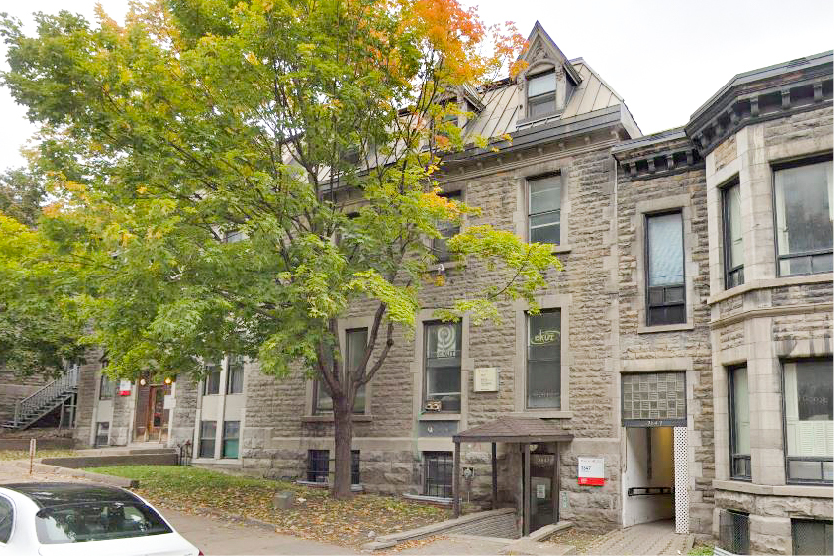A graduate student filed a report against McGill through the Office of Mediation and Reporting (OMR) in August 2022, alleging McGill discriminated against him for denying him on campus housing because of his service dog. He has since taken his case to the Commission des droits de la personne et des droits de la jeunesse (CDPDJ)—a body that hears claims of discrimination under the Quebec Charter of Human Rights and Freedoms—for mediation. The student hopes that McGill will change its policy on service animals and compensate him for additional costs he incurred.
Alex*, an American international student, emailed the student housing office in early May 2022, before the start of his first year at McGill, to request graduate housing with his service dog. Student Housing and Hospitality Services (SHHS) refused his request, saying that McGill only recognizes service animals who are trained by Canadian organizations, such as the MIRA Foundation or the Lions Foundation, so Alex’s dog was considered to be an emotional support animal.
Quebec has no legal definition for service dogs or emotional support animals. Canada’s Accessible Transportation for Persons with Disabilities Regulations, however, defines service dogs as “individually trained by an organization or person specializing in service dog training to perform a task to assist a person with a disability with a need related to their disability.” Emotional support animals are understood as animals that alleviate symptoms, such as depression and anxiety, but who are not trained to assist with disability-specific needs.
Alex originally got his dog as an emotional support animal but told the The Tribune that he had already started personally training his dog through an online program to become a psychiatric service dog when he reached out to SHHS.
“[SHHS] made it clear: They had a very narrow definition of what a service animal was that effectively excluded anybody who did not get their dog from an organization here [in Canada],” Alex said. “I told the housing folks like, ‘hey, with the way you say this policy is, there is no way for an international student with disabilities to have a service dog. That’s a problem.”
Alex was set on living in campus housing because he felt that looking for an apartment would be difficult and complicated as he was unfamiliar with the Montreal area. According to Alex, McGill’s rent would also have been cheaper than finding another place that accepts service animals.
He proposed numerous compromises to address the restriction imposed by SHHS—including getting a service dog certification in British Columbia and getting pet insurance—but SHHS maintained that his dog did not fit McGill’s service animal definition and was not allowed on campus.
Unlike the University of Toronto or Concordia, McGill does not have a central policy on service animals. The only framework governing service animals on campus is McGill’s building policy on animals, which states that the restriction against animals in university buildings “does not apply to trained and certified working service dogs.” However, like the Quebec government, McGill does not define “service dog.” McGill also does not define “trained” or “certified.”
In an email to The Tribune, McGill media relations officer Frédérique Mazerolle explained that the lack of legislation from the Quebec government regarding service animals means accommodations regarding service dogs are made on a “case-by-case basis.” To make a decision, she stated McGill refers to “the attestation of the particular trainer regarding training and behaviour.”
“‘Service dog’ is a term [that is] not specifically defined legally in Quebec, but rather is based on various decisions taken by the Quebec court system; as such, McGill applies a liberal interpretation of how service dog is defined,” Mazerolle wrote. “A similar approach to that of analyzing any request for accommodation is made; the barriers faced by a student are assessed, as well as the dog’s role in addressing the identified barriers.”
Although Alex had already begun training his dog to be a service animal, he accelerated the pace of his training course in the hopes that having the certification would give him access to housing. But with a lack of clear guidance from McGill about what would constitute a service animal, he had to work toward an undefined level of training.
As living in the McGill residence was still up in the air, Alex had to sleep on the floor of an acquaintance’s apartment while he found an alternative housing solution. The lack of a permanent address also meant that Alex ran into banking problems and incurred additional costs because all his items had to be stored since he did not know whether he would be living in a furnished or unfurnished place.
Throughout the summer, Alex contacted several administrators at McGill to figure out a solution. No office was able to find a suitable accommodation and all gave different answers about whether or not Alex’s dog would be considered a service dog under McGill regulations.
“I had a call with the housing director who bounced me to the legal department, saying that it was legal who set the policy, legal bounces me back to housing,” Alex recalled. “I even went through and made an entire chart demonstrating everybody I’ve talked to to show every time I talk to them, because it can be summarized in a clear, linear way. I went through the Office of the Dean of Students who offered some help that was never given to me. I went everywhere you can possibly go.”
Eventually, Alex filed a report of discrimination on the grounds of disability with OMR for both the student housing regulations and the way the employee he dealt with at SHHS treated him. Although Alex hoped to resolve the matter through mediation, the employee at SHHS refused mediation and the case proceeded to an investigation in September 2022.
In October 2022, Alex requested accommodations to bring his dog into classes with him and a free parking spot by campus, but was rejected by Student Accessibility and Achievement and Facilities Management and Ancillaries Services. This denial led Alex to report additional events of discrimination, expanding his case.
The investigator heading Alex’s case reported their findings in December 2022, determining that the SHHS administrator did discriminate against Alex, but that there was a lack of sufficient evidence to prove that the policy was discriminatory. According to Alex, they also noted that McGill should update its framework to define “service animals,” “trained,” and “certified,” and educate administrators on how to interpret and apply the university’s regulations and apply them in alignment with the “large and liberal” interpretation that is necessary to avoid discriminating against people with disabilities.
The investigator also ruled that the SAA decision was discriminatory because it denied Alex’s request on the basis that his dog was not a service dog because the animal did not help with any physical disabilities, but rather developmental disabilities and mental health conditions. The denied request for free parking was not deemed discriminatory.
Alex’s request for his dog to come into classes was eventually accepted and he is now able to apply for housing. His other requests, however, such as disciplinary action against the SHHS employee, financial compensation for the increased cost of housing, and publicizing an updated service animals policy, have not been acted upon.
He currently lives in a two-bedroom apartment with a roommate an hour’s walk from where most of his classes are located. Although the Dean of Students said Alex would be eligible for financial assistance to compensate for his more expensive living arrangement, senior administrative officials denied this request.
The investigation, which occurred from September to December 2022 and will now continue at the CDPDJ, was a large burden to bear, Alex explained. Not only has putting a case together been labour-intensive, but McGill’s requirements for medical documents to grant an accommodation have been “extremely invasive.”
“I was asked for […] a surplus of things that would have never been allowed in the U.S.,” Alex said. “My medical condition and the specific things that [my dog] did to assist me with it, and that documentation was passed around to at least half a dozen people on campus who demanded it from me as a condition for maybe, maybe, granting me an accommodation.”
In the U.S., the Americans with Disabilities Act and the Fair Housing Act limits an institution’s ability to inquire about medical documentation and asking details about a person’s disability is not allowed.
“Normally, I’m not shy at all about talking about my medical history or things like that, but having it pushed and demanded and made a condition of me being treated like every other student was really demeaning, it was humiliating,” Alex continued. “And there’s been no apology for that at all.”
Rine Vieth PhD ‘23, who has experienced reporting discrimination at McGill on the grounds of disability, attributed McGill’s emphasis on documentation to wariness from administrators of people abusing available support.
“There are so many things around accessibility that McGill actually doesn’t have regulations on. And that is taken [by administrators] as […] that sort of activity or whatever is prohibited,” Vieth said. “To me, a lot of it seems to come from this fear of like we can’t let someone who’s not entitled to an accommodation get it.”
Vieth believes McGill should “reframe” the issue in a way that is more accessible, as they think McGill’s current approach disadvantages community members with disabilities.
Some policy reform is being pushed forward. Dean of Students Robin Beech and SSMU vice-president University Affairs 2022-2023 Kerry Yang began discussing the issue in summer 2022 when Alex’s case first came up. In January 2023, a working group with members from SHHS, SAA, SSMU, Campus Public Safety, McGill’s legal department as well as Dean Beech, Yang, and current Law Senator Josh Werber convened to negotiate a new policy and what it would cover.
In an email to The Tribune, Werber said the policy negotiations are ongoing and underscored the importance of a policy for the McGill community, especially one that clearly defines and standardizes the criteria for granting students accommodations.
“Having a policy on both service animals, not just dogs, and [emotional support animals] should, if done properly, expand students’ rights to have animals both in class and in residence to mitigate disabilities and make the classroom more accessible,” Werber said. “At the very least, they would be able to know the kind of medical documentation required to have their animal admitted.”
Alex is hopeful about his case in front of the CDPDJ, but is still frustrated about how McGill handled his accommodation request last year as it has had lasting effects on his life in Montreal.
“While it’s likely to get the things that McGill has denied, it is not a fast process, by any means,” Alex said. “It will never be able to make up for the community that I wasn’t able to have because I couldn’t live on campus. It will never compensate for the networking, for the hours and hours of travel time that I have to go through to get to my classes that other students don’t have to.”
*Alex’s name has been changed to preserve their confidentiality.










